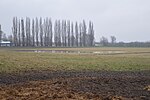Cambridgeshire is a county in eastern England, with an area of 339,746 hectares (1,312 sq mi) and a population as of mid-2015 of 841,218. It is crossed by the Nene and the Great Ouse rivers. The University of Cambridge, which was founded in the thirteenth century, made the county one of the country's most important intellectual centres. A large part of the county is in The Fens, and drainage of this habitat, which probably commenced in the Roman period and was largely completed by the seventeenth century, considerably increased the area available for agriculture.The administrative county was formed in 1974, incorporating most of the historic county of Huntingdonshire. Local government is divided between Cambridgeshire County Council and Peterborough City Council, which is a separate unitary authority. Under the county council, there are five district councils, Cambridge City Council, South Cambridgeshire District Council, East Cambridgeshire District Council, Huntingdonshire District Council and Fenland District Council.In England, Sites of Special Scientific Interest (SSSIs) are designated by Natural England, which is responsible for protecting England's natural environment. Designation as an SSSI gives legal protection to the most important wildlife and geological sites. As of March 2017, there are 99 sites designated in the county. There are eighty-eight sites listed for their biological interest, ten for their geological interest, and one for both interests.
The largest site is Ouse Washes at 2,513.6 hectares (6,211 acres), which is partly in Norfolk. It is internationally important for its wintering and breeding waterfowl and waders, such as teal, pintail and wigeon. The smallest is Delph Bridge Drain at 0.1 hectares (0.25 acres), a short stretch of ditch which was designated because it was found to have a population of fen ragwort, which was believed to have been extinct in Britain since 1857. The only site designated for both biological and geological interests is Ely Pits and Meadows, which has nationally important numbers of bitterns, and has yielded sauropod dinosaurs and pliosaur marine reptiles dating to the Jurassic period.










